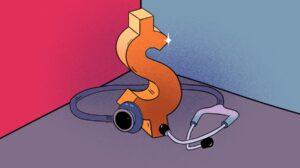For ordinary shareholders, bankruptcy almost always means a total loss. But for the companies that file for bankruptcy reorganization, it’s quite possible to emerge from the process with a bright future ahead.
Numerous prominent brands — including General Motors, American Airlines and Six Flags — went through bankruptcy. Today, they’re multibillion-dollar companies.
Now it looks like some famous failed unicorns are looking to do the same. Over the past few quarters, at least five have reemerged from the bankruptcy reorganization process, or are close to doing so.
Of those, the most closely watched is WeWork, the co-working giant with a one-time $47 billion valuation that filed for bankruptcy in November following a disastrous run as a public company.
New York-based WeWork announced last Tuesday that it is close to finishing negotiations with creditors and expects to emerge from Chapter 11 by the end of the month. Its restructuring plan calls for eliminating $4 billion of outstanding debt and includes up to $450 million in new funding from SoftBank and other stakeholders. WeWork also rebuffed a bid by founder Adam Neumann to buy back the company.
WeWork isn’t the only former unicorn hustling through Chapter 11. Others include:
IronNet: Cybersecurity provider IronNet, which went public during the 2021 SPAC boom and saw its share price and business collapse a couple years later, announced in February that it emerged from Chapter 11 as a private company. The reorganization plan eliminated about $38 million in company debt and added a new asset-based loan of $15 million.
Nu Ride/Lordstown Motors: Embattled electric-truck maker Nu Ride (formerly Lordstown Motors) emerged from bankruptcy in March, moving its corporate headquarters from Lordstown, Ohio, to New York City and changing its ticker symbol to NRDE. Per TechCrunch, the company has “little left to its name,” having sold the factory it once owned to Foxconn and assets tied to its electric pickup truck to an investment vehicle controlled by founder Steve Burns.
Starry: Boston-based Starry, an internet service provider and developer of fixed wireless technology, didn’t fly high for long after going public via SPAC in early 2022 at an initial $1.8 billion valuation. Less than a year later, following steep layoffs and a share price decline of more than 99%, Starry filed for bankruptcy. Last August, Starry emerged from Chapter 11 with restructured finances and a focus on five markets: Boston, New York City, Los Angeles, Washington, D.C., and Denver.
Rockley Photonics: Pasadena, California-based Rockley Photonics, a maker of photonics-based health monitoring technology, emerged from Chapter 11 last June, with $35 million in fresh financing. Rockley raised more than $200 million in venture funding before going public via SPAC in mid-2021 at an initial valuation of $1.2 billion. The company filed for bankruptcy about a year-and-a-half later, and was promptly booted from the New York Stock Exchange.
Second chances
For these companies, which already went public and fizzled badly, a comeback won’t be a win for their initial backers. However, there is potential to salvage business models and technologies that have a shot of viability without so much burdensome debt on their balance sheets.
WeWork, in particular, seems like it could have a real shot at a second chance, given that office space rents have declined in many desirable metros, and teleworkers may be looking for workspace options besides their own homes.
Related reading:
- In Sectors From Diagnostics To Spacetech, More Struggling SPACs Are Going Private
- Have You Heard About The Herd Of Failed And Struggling AI-Focused Unicorns?
- Amazon Aggregator Thrasio Files For Bankruptcy Protection After Raising Billions From Investors
Illustration: Dom Guzman

Stay up to date with recent funding rounds, acquisitions, and more with the Crunchbase Daily.




![Illustration of man searching for vacation rental. [Dom Guzman]](https://news.crunchbase.com/wp-content/uploads/Vacation_Rentals-470x352.jpg)





67.1K Followers